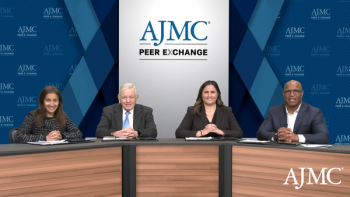
Experts discuss evolving strategies in ER+/HER2– metastatic breast cancer treatment, combining endocrine and targeted therapies, and leveraging specific mutations for optimal patient outcomes.

Experts discuss evolving strategies in ER+/HER2– metastatic breast cancer treatment, combining endocrine and targeted therapies, and leveraging specific mutations for optimal patient outcomes.

Experts explore the efficacy and safety profiles of elacestrant, an oral selective estrogen receptor degrader (SERD), and other options for endocrine therapy. The panelists also discuss clinical trial insights, progression-free survival rates, and tolerability, highlighting outcomes and advances in metastatic breast cancer treatment.

Experts discuss how they determine whether a patient with metastatic breast cancer is a candidate for treatment with elacestrant based on FDA approved indication, NCCN guidelines, and the results of ESR1 mutation and resistance marker testing. Participants also discuss how they determine treatment failure or resistance.

Experts discuss the necessity of ESR1 mutation testing when considering treatment with elacestrant in patients with estrogen receptor–positive (ER+)/HER2-negative (HER2–) metastatic breast cancer and discuss unmet needs in this patient population. They also describe options for mutation and resistance marker testing to guide treatment selection.

Experts delve into practical aspects of using elacestrant in later-line treatment of patients with estrogen receptor–positive (ER+)/HER2-negative (HER2–) metastatic breast cancer, including testing for ESR1 mutations, evaluating efficacy, and monitoring for toxicity.

Experts explore treatment considerations when treating patients with metastatic breast cancer with elacestrant, including dosing, patient selection, adherence, and treatment duration. Participants also discuss dose modifications, adherence concerns, and how they determine treatment failure.

Experts discuss the impact of elacestrant on patient well-being, including potential cardiovascular and gastrointestinal toxicities, quality of life, and patient feedback regarding access to treatment.

Experts discuss oral SERDs in the pipeline, clinical pathways for treatment of breast cancer, and strategies to help ensure patients have access to treatment. The participants also describe diverse agents in development, including their toxicity profiles.

Stephanie L. Graff, MD, provides an overview of ESR1 mutations in ER+/HER2- metastatic breast cancer, highlighting their prevalence, clinical implications, and challenges.

An expert on breast cancer reviews currently available tests for ESR1 mutations and provides clinical insights on best practices for testing.

Focusing on elacestrant, Dr Graff discusses the role of oral SERDs (selective estrogen receptor degraders) in the treatment of patients with ER+/HER2- metastatic breast cancer.

A breast medical oncologist reviews oral SERDs currently in development for the treatment of patients with ER+/HER2 metastatic breast cancer, highlighting camizestrant, imlunestrant, and giredestrant.

Stephanie Graff, MD, concludes the discussion with thoughts on endocrine therapies in development for patients with ER+/HER2- metastatic breast cancer.

259 Prospect Plains Rd, Bldg H
Cranbury, NJ 08512
© 2025 MJH Life Sciences®
All rights reserved.
